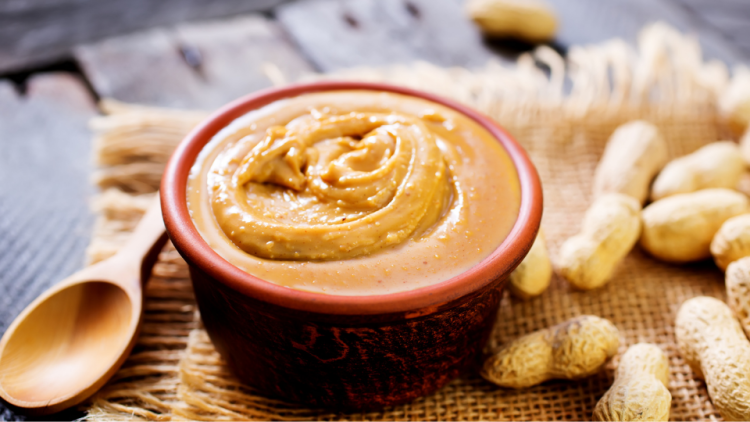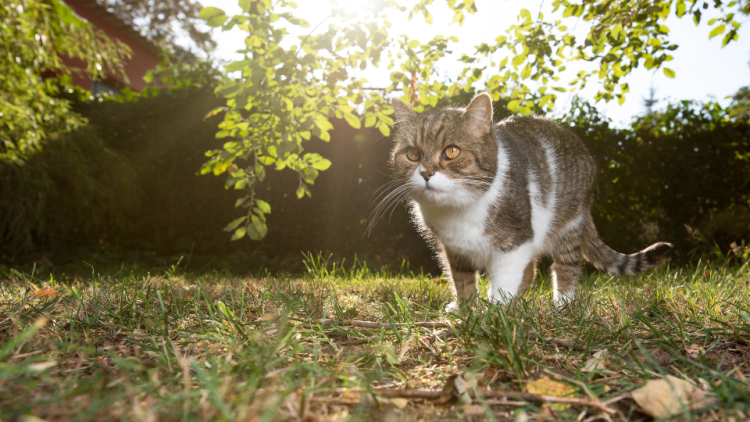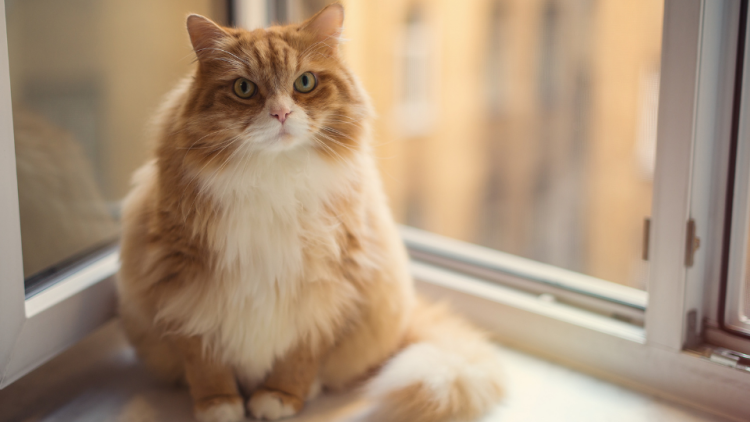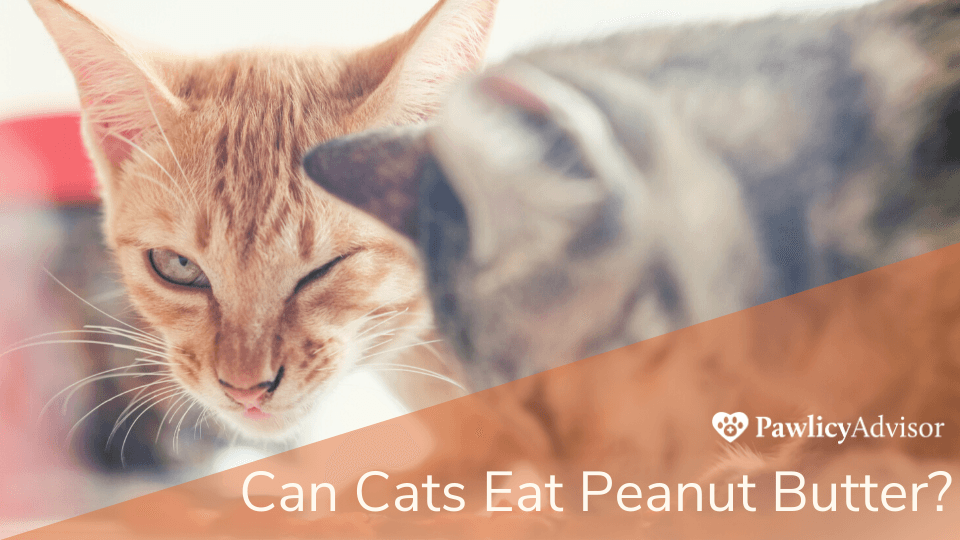We know that dogs can eat peanut butter from time to time, but does the same apply to our feline friends? The answer to this question is a bit more complicated than it might seem.
While peanuts offer a number of health benefits for us, cats process many human foods differently than people. So, even though some fare might be safe or even beneficial for cats to consume, others can cause gastrointestinal (GI) issues and other health problems. Is peanut butter one of those foods? Let’s find out.
Table of Contents:
- Can cats eat peanut butter?
- Is peanut butter safe for cats?
- Risks involved with feeding cats peanut butter
- Can cats eat peanuts?
- Important feeding safety tips for cats
- Healthier alternatives to peanut butter for cats
- Key Takeaways
Pro Tip: A pet insurance plan can be a great idea for cat parents, even if your furball stays inside. Any cat can get hurt and end up needing expensive veterinary care. For example, your feline companion could eat something they’re not supposed to or suffer from ailments like diabetes or cancer. By signing up for pet insurance, you make sure you will be able to give your cat the best veterinary care possible with less worry about the expenses.
Can cats eat peanut butter?
Nutritionally, the benefits of peanut butter are countless. In addition to containing high levels of protein and good fats, this tasty treat also has folate, biotin, copper, phosphorus, and many other nutrients. However, these benefits apply only to humans, not cats.
The feline digestive system cannot metabolize the high quantities of protein and fats found in peanut butter. Cats are carnivores and they don’t really need peanut butter in their diet. In fact, feeding your cat with something that’s not part of their daily diet can lead to feline obesity.
Another question is: Do cats like peanut butter? Cats are picky eaters and have different eating habits than dogs. While pups usually love peanut butter as much as people, most cats will probably turn their heads away if you try to feed them some sticky peanut butter paste. For the felines that do like peanut butter, it’s best to limit its use to medication administration.
Is peanut butter safe for cats?
That being said,peanut butter is not toxic to cats. Cats can consume peanut butter but only occasionally and in small amounts.** Too much peanut butter can cause stomach upset. Half a spoon twice a week, preferably followed up with freshwater, should be enough. Considering the fact that the nutritional value of peanut butter for cats is practically non-existent, limiting the servings won’t make any difference.
Since felines evolved as carnivores, your pet already gets everything they need from eating fish and meat alone. As a plant protein source, peanut butter doesn’t contain all the amino acids cats require the way that animal proteins do. This means that you don't need to supplement their diet with anything beyond their normal cat food.
Peanut butter is considered to be safe for healthy cats, but avoid giving it to cats with medical conditions.

Risks involved with feeding cats peanut butter
Peanut butter can lead to GI upset in cats resulting in vomiting, diarrhea, gas, and stomach pains.
If you’re feeding your cat peanut butter for the first time, be sure to keep an eye on them for possible allergic reactions. While cats are known to have food allergies of varying degree, an allergic reaction to peanut butter can quickly become life-threatening. Symptoms of an allergic reaction include:
- Diarrhea
- Vomiting
- Facial swelling
- Severe itching
- Lack of appetite
- Hair loss
- Chronic ear infections
- Weight loss
If your cat experiences symptoms of GI upset or signs of allergy, stop feeding them peanut butter and contact your vet right away. Do not give OTC medications intended for human use as they can be toxic to cats. If the symptoms persist, make an appointment with your veterinarian to receive further treatment.
There’s also a potential hazard of choking that cat parents should be aware of. Because of its thick and sticky texture, peanut butter can create a large clump which might cause an obstruction in your cat’s throat.
Because peanut butter is high in calories and trans fats, it can also cause diabetes and weight gain. Cats struggling with weight issues should stay away from any peanut butter treats.
It can also be contaminated with aflatoxins, a common type of mycotoxin that can pose a serious threat to health in felines. Mycotoxins are known to be one of the most cancer-causing substances and are also known to be incredibly toxic for the liver.
Outdoor cats shouldn’t be encouraged to develop a taste for peanut butter. This can be dangerous if they try to eat peanut butter that’s used as bait in a mouse trap or smeared on a contaminated food source.

Can cats eat peanuts?
Like peanut butter, peanuts aren’t toxic to cats but should be served in small amounts. If you want to treat your cat with some peanuts, make sure to choose raw, unsalted peanuts, as cats’ digestive systems can have trouble handling additives like spices, salt, oil, and seasoning. Avoid peanuts that are covered in chocolate as well.
In addition, only offer peanuts removed from the shell because the hard outer shell is a choking hazard and can put your pet at risk of intestinal obstruction.
Finally, felines can develop an allergy to nuts at any point in life, . Watch out for signs of skin irritation or GI issues like vomiting and diarrhea.
What about other nuts? While peanuts aren’t toxic, some nuts can be detrimental to your cat’s health. It's probably best to keep macadamia nuts out of your cat’s reach as they can cause vomiting, hyperthermia, lethargy, and tremors. Other nuts like almonds or Brazil nuts might not be inherently dangerous, but you should keep in mind that they are still high in fat, which can be problematic for cats.
Important feeding safety tips for cats
Although peanut butter isn’t recommended for cats, if you still want to make an attempt, make sure to adhere to the following rules:
Read the labels carefully. Many kinds of peanut butter contain xylitol, a sugar substitute that can be toxic to cats. According to ASPCA, xylitol in cats can cause a sudden release of insulin, causing hypoglycemia, a condition in which the cat’s blood sugar levels are lower than normal. Signs that your feline friend might have eaten something containing xylitol include vomiting, lethargy, lack of coordination, and even seizures and coma. Ultimately, cats that eat xylitol might end up with liver failure, resulting in death.
You should also watch for added sugar ingredients. Peanut butter with a high sugar content is harmful to cats because it can lead to inflammation, obesity, diabetes, and in some cases, cancer.

Check the label for the sodium content, as well. High sodium levels can have a negative impact on cats with heart issues and increased blood pressure. Unsalted peanut butter is the safest option. The majority of a cat’s calories (90%) should come from specially formulated foods. Treats of any kind, including peanut butter, should make up no more than 10% of their daily calorie intake.
Pro Tip: Pet insurance offers coverage for illnesses and accidents, which includes veterinary exam fees, medication, and hospitalization.
Healthy alternatives to peanut butter for cats
If you’re for some healthier treat options for your kitty, consider feeding them veggies instead of nuts. The list of cat-safe vegetables includes celery, zucchini, carrots, spinach, pumpkin, broccoli, and peas.
Don’t forget that cats are carnivores and use these alternative treats sparingly. Never substitute full meals with vegetables as your cat will miss out on the essential nutrients found in properly formulated cat food. Always talk to your vet before offering your cat new foods.
Key Takeaways
- Technically, peanut butter is not poisonous for cats. However, veterinary experts agree that it should only be fed occasionally and in small amounts.
- Since peanut butter is high in fats, it can contribute to obesity and diabetes. In addition, its sticky, nutty texture can present a choking hazard.
- It’s also possible for your kitty to have an unknown peanut allergy which can prove to be life-threatening.
- Overall, felines shouldn’t eat peanut butter, unless it’s being used as a way to give them medication.
- Talk to your vet before giving your cat any human foods, even if they are considered safe for animal consumption.
